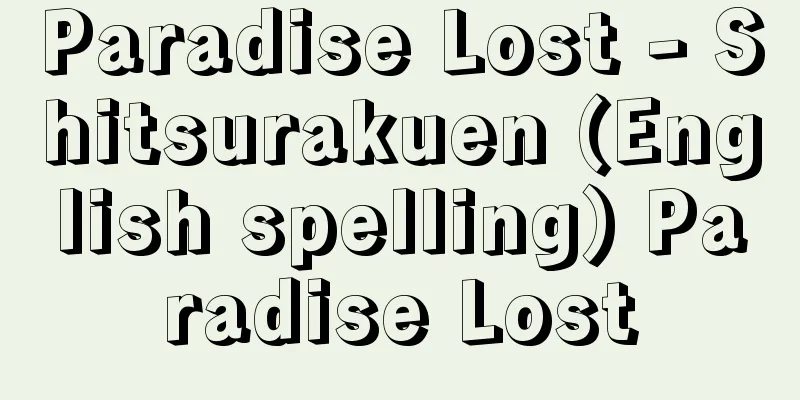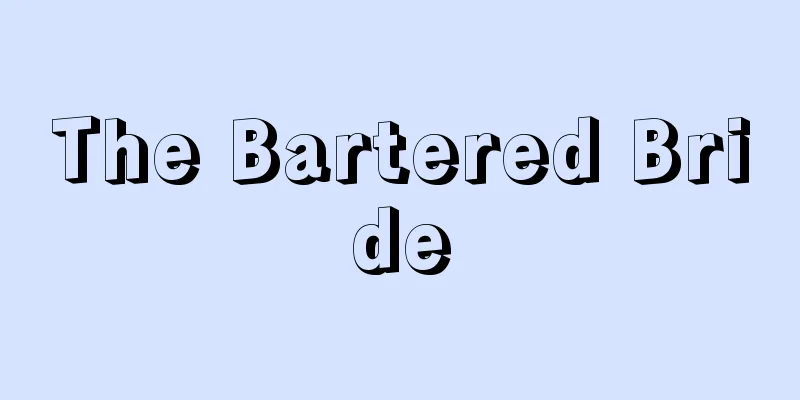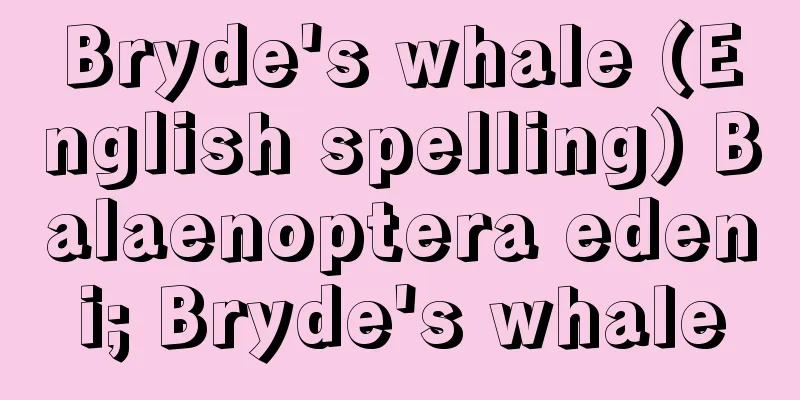Paradise Lost - Shitsurakuen (English spelling) Paradise Lost

|
A full-length epic poem by the English poet Milton. Published in 1667. The first edition was in 10 volumes, but after the reprinting (1674) it was compiled into 12 volumes, which is the standard edition today. This epic poem, the greatest in English literature, is based on the story in the Book of Genesis in the Old Testament, in which Adam and Eve, the first humans created by God, are tempted by the devil Thetan (Satan), to eat the forbidden fruit in Paradise, and are banished from the garden. The author's intention is clear from the words uttered at the beginning of the first book: "I will preach the law of eternity, and make known to men the righteousness of God's will." In other words, Milton tried to make it clear to his readers and to himself that, despite man's original sin, God is trying to save man by showing him an act of love and grace, the atonement through the blood of his only Son, Jesus Christ. In paradise, the power of the anti-trinity, consisting of the devil (thetan), "sin," and "death," acts on man from below, while the power of the trinity, consisting of God, the Son, and the Holy Spirit, acts on man from above. Man (Adam and Eve) succumbs to the power from below, but leaves paradise believing that he will be saved by the providence from above. Against the backdrop of infinite space and time, the horrific scenes of hell and the splendor and harmony of heaven are depicted, and the green world of paradise in a corner of the earth, where these two poles point, emerges vividly. Milton, who had already gone blind, makes full use of his unique imagery and musical effects to strongly appeal to the imagination, emotions, and faith of his readers. [Masaho Hirai] "Shigeno Tenrai's translation of "Paradise Lost" (2 volumes, 1948, Oizumi Shoten / 3 volumes, Shincho Bunko)" ▽ "Fujii Takeshi's translation of "Paradise Lost" 3 volumes (Iwanami Bunko)" [Reference] |Source: Shogakukan Encyclopedia Nipponica About Encyclopedia Nipponica Information | Legend |
|
イギリスの詩人ミルトンの長編叙事詩。1667年刊。初版は10巻であったが、再版(1674)以降12巻に編成され、これが今日の定本となっている。このイギリス文学最高の叙事詩は、神につくられた最初の人間であるアダムとイブが悪魔セイタン(サタン)に誘惑されて楽園(パラダイス)にある禁断の木の実を食べ、楽園から追放される、という『旧約聖書』の「創世記」の記事を素材としている。そして、作者の意図は、「われ永遠(とこしえ)の摂理を説き/人々に神の慮(おもい)の正しきを明らかにせん」という第1巻の初めに吐露されたことばに示されている。いいかえれば、人間が原罪を犯したにもかかわらず、神は独(ひと)り子イエス・キリストの血による贖罪(しょくざい)という愛と恩寵(おんちょう)の行為を人間に示すことによって人間を救おうとしていることを、ミルトンは読者と自身に向かって明らかにしようとした。楽園における人間に向かって、下から、悪魔(セイタン)と「罪」と「死」といういわば反三位(さんみ)一体の力が作用し、上からは、神と子と聖霊という三位一体の力が作用してゆく。人間(アダムとイブ)は下からの力に屈するが、上からの摂理によってやがて救われることを信じて、楽園を去ってゆく。 無限の空間と時間を背景に、あるいは地獄の凄惨(せいさん)な様相が、あるいは天国の光輝と調和に満ちた姿が描かれ、そしてその二つの極が指向する、地球上の一角にある楽園の緑の世界が鮮やかに浮かび上がる。すでに失明していたミルトンは、独特の心象と音楽的効果を駆使し、読者の想像力と心情と信仰に、強烈に訴えてくるのである。 [平井正穂] 『繁野天来訳『失楽園』(全2巻・1948・大泉書店/全3冊・新潮文庫)』▽『藤井武訳『楽園喪失』全3冊(岩波文庫)』 [参照項目] |出典 小学館 日本大百科全書(ニッポニカ)日本大百科全書(ニッポニカ)について 情報 | 凡例 |
<<: Sillanpää - Sillanpää (English spelling) Frans Eemil Sillanpää
>>: Utility model - utility model (English spelling)
Recommend
Alexios I
1048‐1118 Byzantine Emperor. Reigned 1081-1118. A ...
Calcutta
The largest city in eastern India. Capital of West...
Gaucho - Gausho
...the cowboys of the Pampas, which straddle Arge...
Tsuma [village] - Tsuma
The village occupies the southwestern part of Dogo...
Aztec tobacco (English name) Aztectobacco
...Currently, 65 species of the Nicotiana genus h...
dialogue
…It is also written as 〈kohaku〉 or 〈haku〉. One co...
Safety Week - Anzenshukan
This is a week to take special care to prevent acc...
Adolf Glassbrenner
1810‐76 German poet and journalist. Pen name Adolf...
Mishnah
...In fact, the main text of the Talmud alternate...
Weber syndrome
…In particular, in cases of brainstem damage, the...
Oshizawa
...During the Edo period, Hibara was part of the ...
Cavaignac, E. (English notation) CavaignacE
…He was a politician who led the revolutionary re...
Rhumba
…Cuban popular music. In English, it is called rh...
Castile Bras - Castile Bras
...Today, when people generally talk about tonali...
Shimazu Tadahisa
A military commander in the early Kamakura period...









